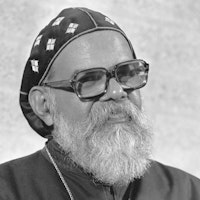And it is a great temptation for us to join up as religions against the secular world or against the atheistic world. Unless we can keep them in the dialogue we will not see that humanity for which I believe my Lord Jesus Christ became incarnate, died, and lives today.
And it is a great temptation for us to join up as religions against the secular world or against the atheistic world. Unless we can keep them in the dialogue we will not see that humanity for which I believe my Lord Jesus Christ became incarnate, died, and lives today.
Paulos Mar Gregorios

Keep Them in the Dialogue
Topic: Interfaith Pathways
“And it is a great temptation for us to join up as religions against the secular world or against the atheistic world. Unless we can keep them in the dialogue we will not see that humanity for which I believe my Lord Jesus Christ became incarnate, died, and lives today. It is that humanity and that created order to which Christianity must renew its commitment.”
Paulos Mar Gregorios, born as Paul Varghese in Kochi, embarked on a journey through continents and disciplines, eventually becoming a luminary in Orthodox Christianity. His early role as a trade union leader and educational reformer in Ethiopia led to his priesthood in 1961. His academic journey took him from the United States to Oxford and Germany, where his doctoral work on Mar Gregorios of Nyssa laid the groundwork for his contributions to theology and humanism.
Upon returning to India, Gregorios's influence expanded through his roles in the church and academia, blending spiritual dedication with intellectual rigor. He served as a bishop and Metropolitan of the Delhi diocese, spearheading projects for peace, justice, and inter-religious dialogue. His work with the World Council of Churches and in international forums reflected his commitment to a faith that acts in the service of humanity.
Mar Gregorios's legacy lies in his contributions to theology, ecumenical dialogue, and social justice. As a writer and speaker, he offered insights that bridged Eastern and Western perspectives, emphasizing the harmony between spiritual and intellectual pursuits. His work inspires those seeking to understand the faith-human condition relationship, advocating for a world where truth and love form the foundation of human existence.
The Christian Heritage
Bryant, M. Darrol., et al. Assembly of the World's Religions, 1985: Spiritual Unity and the Future of the Earth: a Report. Paragon House, 1986, p.175 [Metropolitan Paulos Mar Gregorios, The Christian Heritage].

Paulos Mar Gregorios
Resources
Copyright © 2017 – 2026 LuminaryQuotes.com About Us

Metropolitan Paulos Mar Gregorios
“I see the whole of humanity in the context of my Christianness. It is my deep-rootedness in Christian faith that enables me to be inclusive. And this is not exclusivity: it is a partial closing, which is necessary in order to be fully open. God is not just transcendent; but is also immanent in the universe. The otherness and the oneness have to be kept in dialectical tension.”
–Metropolitan Paulos Mar Gregorios [Assembly of the World’s Religions, 1985 (Paragon House)] pp. 174-175.
A Further Restoration
“I want to speak about a further restoration that is necessary… There is no word for “religion” in most of our religions…. All life was bound up with religion. There was no realm called secular and another department called religious. We have bifurcated these unnecessarily. I don’t want to go into the history of this, but today this is important, not only for the renewal of Christianity, but also for interreligious dialogue. If our intention is to unite all the religions against the so-called atheism, it will still be with the old crusading mentality, and we will lose our very heritage in the process.”
–Metropolitan Paulos Mar Gregorios [Assembly of the World’s Religions, 1985 (Paragon House)] pp. 174-175.
Our Openness to the Secular World
Our openness as religious persons to the secular world is for me of fundamental importance. Three concerns push me to that conclusion… Why do people feel despair and meaninglessness in the affluent society? [I must deal with that question in interreligious dialogue.] Second, I must deal with the question of justice in the world. If I do not deal with that question, my religion becomes pointless. The third is the ecological question. Catastrophe, ecological as well as nuclear, has become a real threat. And if my religion is to be related to that, I must also have relation to the atheist, the unbeliever, the indifferent. And it is a great temptation for us to join up as religions against the secular world or against the atheistic world. Unless we can keep them in the dialogue we will not see that humanity for which I believe my Lord Jesus Christ became incarnate, died, and lives today. It is that humanity and that created order to which Christianity must renew its commitment.
–Metropolitan Paulos Mar Gregorios [Assembly of the World’s Religions, 1985 (Paragon House)] pp. 174-175.